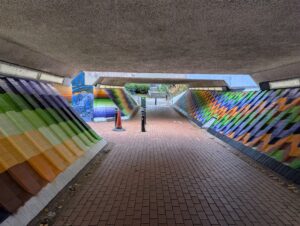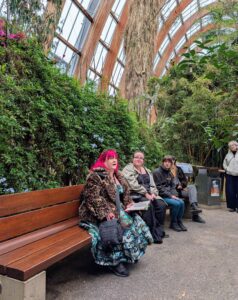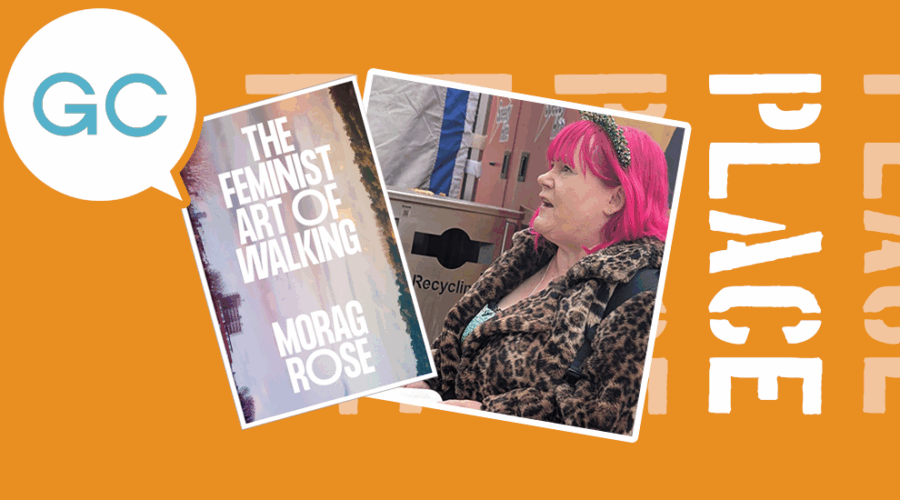I’ve never done a walking tour quite like the Feminist Art of Walking with Morag Rose. Nobody was pointing at obscure bits of buildings or talking about the properties of plants in the area. Instead, Rose was reading from her book of the same name as we picked a route by rolling a dice.
Morag Rose is a Senior Lecturer in Geography at The University of Liverpool and founder of the Loiterers Resistance Movement, a “collective of artists, activists and urban wanderers interested in psychogeography, public space and the hidden stories of the city”.
She began the tour by saying that she was aware she was in Sheffield, the city with a strong history in fighting for the right to roam (a cause she supports), but that she also wants the right to loiter – to simply exist in public space without having to be purposeful or do anything in particular.
I was immediately intrigued. This sounded very much like my kind of thing.
Organised by feminist bookshop Juno Books, the Feminist Art of Walking tour took me round the very familiar city centre of Sheffield but in a far more thought-provoking way than I’m used to. Rather than seeing the sights, we were guided to look internally at how we feel we fit into public spaces. It occurred to me how deeply my answers were affected by my surroundings, my history and my identity.
Where would I go if I wasn’t afraid? Where would I go if I felt more welcome? Where do I avoid? Where do I feel comfortable? Do I make others feel more or less comfortable when I’m there?
I’m a woman in public space. I’m a disabled person in public space. I’m a lesbian – sometimes visibly, sometimes less so – in public space. I have life experiences that affect how I exist in public space, too, and Rose’s tour and readings made me consider these intersectional aspects of my identity and life and how they impact my sense of entitlement to the world around me.
I’m also a white person, and a cis person, which gives me privileges over others in ways that I probably do not always consider as much as I should. How do they affect which public spaces I feel welcome in that others might avoid?
 In some slightly twisted irony, it did not escape my attention that to get to and from the event, I walked through the same underpass where a stranger exposed his genitals to me many years ago. The underpass is more colourful and a lot lighter these days, but I rarely turn that corner without remembering him and what he did.
In some slightly twisted irony, it did not escape my attention that to get to and from the event, I walked through the same underpass where a stranger exposed his genitals to me many years ago. The underpass is more colourful and a lot lighter these days, but I rarely turn that corner without remembering him and what he did.
It wasn’t especially traumatic, thankfully, but in other circumstances, or on another day, it might have been.
It has still stuck with me for a couple of decades, however. These are the things that make us reconsider our place, our safety, and our role in public spaces, even if they don’t scar us for life.
Wandering around the city, I was particularly fascinated by Rose’s mentions of the strange differences between parts of a city centre that are owned by the local authority, and parts that are owned by business.
At one point, we stopped in the Peace Gardens to look at the line on the ground where cleaning had stopped – a quiet indication that the Council’s responsibilities had ended and a private company’s had begun.
 As a group, we experienced a profound moment when, for the first and only time in her national tour, Morag Rose would read a piece of writing about the place she was in at that moment; in the beautiful Winter Garden, Rose read her thoughts about the place; there was power in that synchronicity.
As a group, we experienced a profound moment when, for the first and only time in her national tour, Morag Rose would read a piece of writing about the place she was in at that moment; in the beautiful Winter Garden, Rose read her thoughts about the place; there was power in that synchronicity.
Disabled access had been well considered – Rose herself is a crip – though I did find myself left behind the group a few times, wondering if I’d catch up. However, surfaces and access were taken into account throughout, which is enough of a rarity to be commented on and appreciated.
As well as being insightful in the moment, the Feminist Art of Walking tour has stuck with me. I had a conversation with the friend I had attended with immediately afterwards, in which we talked about where we do and don’t feel welcome, as women in public spaces.
Personally, I was able to understand some things about myself that I had been musing over for months but that only made sense after an hour being led around my familiar town by a woman with exceptionally pink hair.
That friend and I have both said that we have thought about the experiences many times since, and I suspect I will continue to do so for many more months. The question of where we belong, and where we are allowed to belong, needs further exploration in wider society because, once again, the personal is political.
Find other Feminist Art of Walking tours across Britain here.
Images: Philippa Willitts

